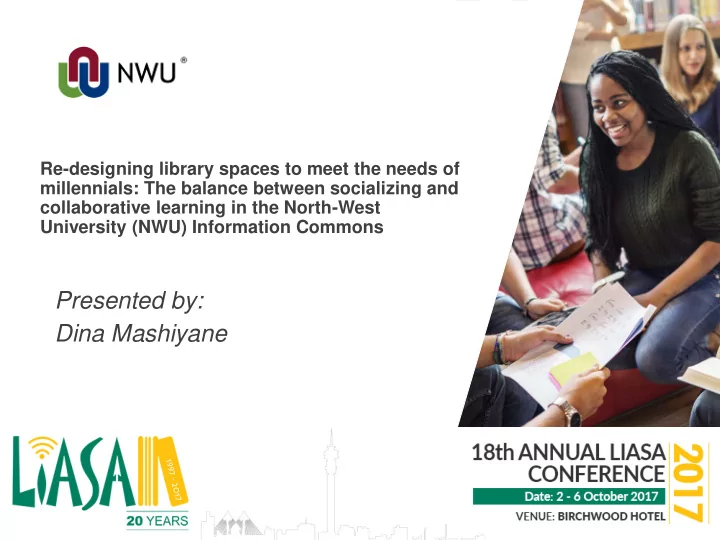

Re-designing library spaces to meet the needs of millennials: The balance between socializing and collaborative learning in the North-West University (NWU) Information Commons Presented by: Dina Mashiyane
OVERVIEW Introduction Pedagogies in higher education Information Commons: Library as place Benefits Challenges LibQUAL 2016 Action Plan
INTRODUCTION The (NWU) Ferdinand Postma Library has re-invented its spaces to meet the changing needs of its users and also to stay abreast of ICT and pedagogical approaches. However, as much as these changes are benefiting the library and it’s users, there are also challenges associated with them. According to Gayton (2008:326) “raising comfort levels in libraries leads to a casual atmosphere that creates challenges in separating noise levels. Therefore, the traditional noise-restrictive library has shifted to a casual environment conducive to social interaction and inevitably higher noise levels” This then breeds the behavior of socialization which tends to be difficult to manage and may disrupt a conducive environment which enhances academic productivity.
PEDAGOGIES IN HIGHER EDUCATION Blended learning Collaborative learning Adapts to the needs of the students Involves various stakeholders
INFORMATION COMMONS
NWU INFORMATION COMMONS IN A NUTSHEL 90 work stations and computers Training facility Equipment for checkout Embrace social media Lockers available for booking Friendly staff trained to assist Printing and scanning facilities Reference collection Seminar rooms with LED screens Wi-Fi Power plugs for laptops and tablets Computers for students with special needs
INFORMATION COMMONS BENEFITS Re-invention of library services & spaces Extension of a classroom One-stop shop Provider of information to a facilitator of learning Flexible environment (non-restrictive) Formal, informal and (mutually inclusive) non-formal Entice students in using the library Comfortable and organized
INFORMATION COMMONS CHALLENGES Social hotspot Usage of computers for non-academic purposes Reservation of computers for long hours Noise • Beneficial to some groups, whereas other groups suffer in the process Development of conflicts between librarians and students due to disruptive behavior. Information commons designated as a “silent zone”
TRAINING & COLLABORATIVE SPACES
LibQUAL 2016
UNDERGRADUATES :LIBRARY AS SPACE
ACTION PLAN Implementation and reinforcement of the code of conduct Roving regularly (also providing assistance) Possibility of appointing noise monitors Installing of software to minimize reservation of computers Benchmark with information commons from other institutions. Non designation of the information commons as a “silent zone” Embrace change in our libraries
REFERENCES Gayton,T. 2008 “Academic Libraries: Social or Communal? The Nature and Future of Academic Libraries.” Journal of Academic Librarianship, 34(1): 60–66. Seal, R.A. 2015. Library spaces in the 21st century: Meeting the challenges of user needs for information, technology, and expertise. Library Management , 36 (8/9), pp.558-569.
THANK YOU Dina Mashiyane North West University: Ferdinand Postma Library Librarian: Undergraduate Support 0182852632 dina.mashiyane@nwu.ac.za
Recommend
More recommend